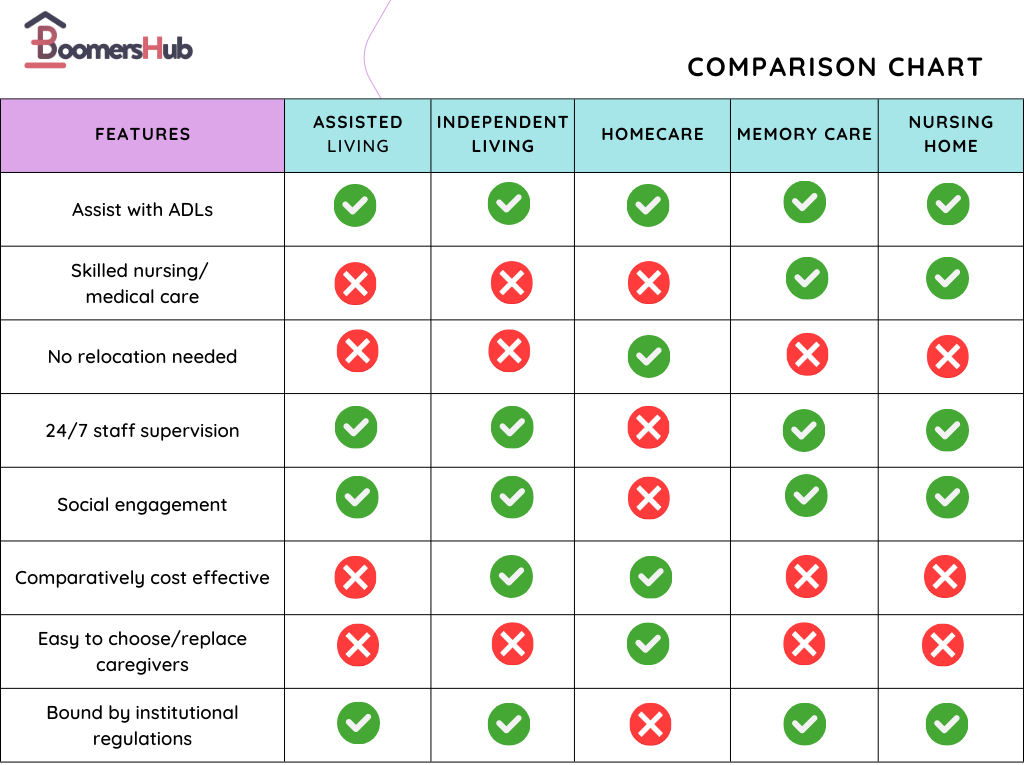Article Contents
Assisted living is a type of senior living arrangement that provides a supportive environment for seniors who need assistance with daily tasks but do not require around-the-clock medical care. Assisted living facilities vary in size, services, and amenities, but they all have the same goal: to help seniors maintain their independence while providing the support they need to live life to the fullest.
Though assisted living communities are great, they may not be the most suitable senior care option for everyone. For example, skilled nursing facilities or nursing homes could be a better alternative for older adults with advanced medical care requirements. In this blog, we will look into some of the alternatives to assisted living, so you can make an informed decision about your elderly loved one’s care needs.
What are the pros and cons of assisted living?
Assisted living facilities provide many benefits to seniors, but they also have some limitations. Here are the pros and cons of assisted living:
Pros
- Provides assistance with activities of daily living (e.g., dressing, eating, bathing, etc.)
- Provides a safe and secure environment for seniors with 24/7 staff supervision.
- Offers a sense of community and social interaction with activities and events, such as game nights, movie screenings, and fitness classes.
- Offers a variety of amenities and services, such as transportation, medication management, housekeeping, etc.
- Offer nutritious meal plans that are tailored to seniors’ dietary needs.
Cons
- Assisted living can be expensive, and not all seniors can afford it.
- Some older adults may feel like they are losing their independence by moving into an assisted living facility.
- Seniors may feel isolated from their families and loved ones.
- Assisted living facilities are not equipped to provide around-the-clock medical care.
What are the alternatives to assisted living?
As we said, assisted living is not the only option for seniors who need extra support and care. So, let’s explore some of the alternatives to assisted living and their benefits.
1. Assisted Living vs Independent Living
Independent living facilities are ideal for those who can still live independently but want to downsize their living space and have access to amenities and social opportunities. One of the significant benefits of independent living is that it offers a low-maintenance lifestyle. Residents don’t have to worry about property maintenance, yard work, or housekeeping.
Furthermore, independent living usually offers a range of amenities such as fitness centers, swimming pools, libraries, and social activities to keep residents active and engaged. However, independent living does not provide the same level of care as assisted living. Therefore, it is suitable for the elderly who do not need extensive medical attention or assistance with daily activities.
2. Assisted Living vs Homecare
Home care is a popular alternative to assisted living. It involves seniors remaining in their homes while receiving assistance and support from caregivers or family members. One of the benefits of home care is that seniors can remain in their familiar environment, which can help reduce stress and anxiety. Additionally, it helps older adults maintain a sense of control over their lives, which can be very important for their mental and emotional well-being.
Another benefit of home care is that it’s more flexible than assisted living, as seniors can receive care on their own schedule. Finally, home care is less expensive than assisted living, as no facility fees or other costs are associated with living in a retirement community.
3. Assisted Living vs Memory Care
Memory care is one of the assisted living alternatives that offer specialized care and support to individuals with Alzheimer’s disease, dementia, or other memory impairments. Though some assisted living communities may have a separate memory care wing, there are senior living options solely focused on providing memory care. These communities are designed to help residents manage their symptoms and maintain a high quality of life.
Memory care facilities provide specialized activities and therapy programs to maintain cognitive function and engage with others. They also have trained staff and caregivers who understand the unique challenges faced by residents with memory impairments and can provide individualized care to meet their needs.
4. Assisted Living vs Nursing Home
Older adults who have chronic health conditions, or are recovering from a surgery, or trauma, often require a higher level of medical care which assisted living facilities cannot provide. In this situation, skilled nursing facilities or nursing homes are appropriate options.
One of the benefits of nursing homes is that they provide a high level of medical care and supervision. Residents have access to nurses and other medical professionals who can monitor their health and provide treatment as needed. Nursing homes may also have more specialized equipment and resources than assisted living facilities. But they can also have some downsides. For example, they can be isolating and too institutional, with very little autonomy. Additionally, they are quite expensive, and not all insurance plans cover them.

Alternatives to assisted living
Some other assisted living alternatives
Apart from the four major assisted living alternatives, there are some other senior care options available. Here are some options:
1. Continuing Care Retirement Communities (CCRC)
Continuing care retirement communities (CCRCs) are another alternative to assisted living that provide a range of care options in one location. With this option, seniors can move into a community that offers independent living, assisted living, and skilled nursing care. CCRCs allow seniors to remain in the same community as their care needs change over time.
One of the biggest benefits of CCRCs is the peace of mind they provide. Seniors can move into a community knowing they will have access to the care they need as they age. Additionally, CCRCs offer a variety of amenities and activities that can help seniors stay active and engaged.
2. Adult Day Care
Adult daycare is another alternative to assisted living that can provide seniors socialization opportunities and care during the day. Adult daycare centers can be a good fit for seniors who need extra support during the day but don’t require 24-hour care.
One of the most significant benefits of adult daycare is the socialization it provides. Seniors have the chance to meet new people and participate in activities they enjoy, which can help prevent feelings of loneliness and depression. Additionally, adult day care can be more affordable than other options as well as allowing family caregivers a much-needed break from caregiving duties.
3. Senior Co-Housing
Senior co-housing is a relatively new concept in senior care. It involves older adults living together in a community while maintaining their own private living spaces. Co-housing communities typically provide shared spaces, such as kitchens and living rooms, where residents can socialize and engage in communal activities.
However, co-housing does have some drawbacks. One of the biggest challenges is finding a community that is a good fit for the senior. Additionally, they may not be feasible for the elderly who require specialized care or have mobility issues. Finally, co-housing may not provide the same level of privacy and autonomy as aging in place or home health care.
Final thoughts
Assisted living has long been the go-to option for families seeking care for their elderly loved ones. But as seen in this post, there are a variety of alternatives available that may be better suited to the needs and preferences of both seniors and their families. From in-home care to independent living to continuing care retirement communities, there is no shortage of options to explore.
When considering senior care options, it is important to keep in mind the unique needs and wants of each individual. We hope that this post has provided valuable insight into the range of senior care options available. If you have any other questions regarding these alternatives to assisted living, please reach out to us!
Related articles:
- Homecare alternatives: What other senior care options are available?
- Finding The Right Affordable Assisted Living for Low-Income Seniors
- Respite care for the elderly: some of the best options
- 5 Levels of Care in Assisted Living
- Choosing the Right Assisted Living Facility
FAQs
- How long do most people live in assisted living?
According to a study by the National Center for Assisted Living, the average length of stay in assisted living is about 22 to 28 months. However, this can vary greatly depending on the individual’s health and needs.
- At what age do most people need assisted living?
Most people require assisted living when they are in their late 70s or early 80s.
However, the need for assisted living can vary depending on individual health and lifestyle factors. For example, some people may require assisted living earlier in life due to chronic medical conditions or disabilities, while others may be able to live independently well into their 90s.
Ultimately, the decision to move into assisted living should be based on an individual’s physical and emotional needs, as well as their personal preferences and financial situation.
- How do I know if my parents should go to assisted living?
While every individual’s circumstances are unique, there are some general signs that may indicate it may be time to start considering assisted living for your parents. For example:
- If your parents have difficulty performing daily tasks such as bathing, dressing, and using the bathroom.
- There is very little opportunity for social interaction which leads to higher instances of loneliness or depression.
- They are showing signs of memory loss, wandering, or hallucination.
- If you or other family members are providing care for your parents and experiencing caregiver burnout.
- If your parents’ home is no longer safe for them due to hazards such as stairs, slippery floors, poor lighting, etc.
- How to not feel guilty about putting parent in assisted living?
If you are struggling with the decision to put your parent in assisted living, it is essential to remember that you are not alone. Many people face this difficult decision, and it is not an easy one to make. Here are some tips to help you overcome feelings of guilt:
- Remember that you are doing what is best for your parent. Assisted living facilities provide round-the-clock care and support that you may not be able to provide on your own.
- Recognize that you have limitations. Taking care of a parent can be physically and emotionally draining, especially if they have complex medical needs.
- Take comfort in the fact that your parent will have access to social activities and a community of people their own age. It can improve their quality of life and overall well-being.
- Stay involved in your parent’s life. Make sure to visit them regularly and participate in activities with them. That will help you stay connected and alleviate feelings of guilt.
- Seek support from family, friends, or a therapist. Talking about your feelings can help you process and find ways to cope with your decision.

